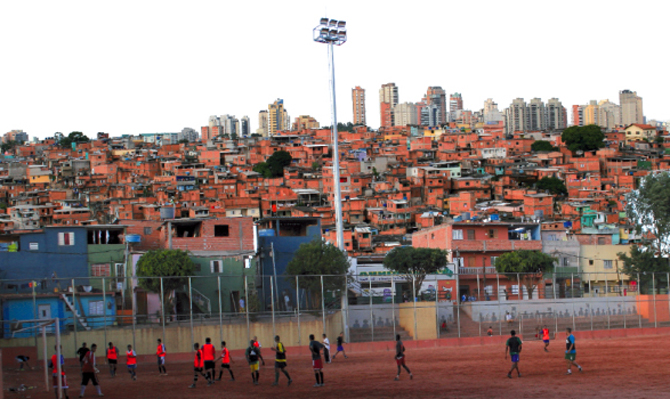Re-act Lab: São Paulo Architecture Experiment
12 - 22 August 2010
In collaboration with Elisabete França and the Secretaria Municipal de Habitação of the city of São Paulo (Sehab) and S.L.U.M. Lab Columbia University, New York

BACKGROUND
ANCB's Re-act Lab has a potential-focused rather than problem-focused agenda. It confronts the particular challenges of cities or regions throughout the world by facilitating transdisciplinary enquiry into appropriate and responsible actions in architecture and urbanism. This 10-day Re-act Lab research studio will introduce a group of advanced students from across the world to the realities of Brazilian cities and provide the wider public with internal and external perspectives on these. In a series of public lectures and discussions the studio will: introduce São Paulo's metropolitan area by revealing the contrasting morphologies and urban tissues produced over time; address the critical role of everyday life in the experience of urban space; question the possibilities created for architecture and urban planning when housing basic municipal services-key structures in improving quality of urban life; and highlight the need to develop partnerships between the city planning authorities and urban pioneers, in order to build liveable cities at the beginning of the 21st century.
I. PUBLIC LECTURES
Thursday, 12 August 2010
Welcome
Hans-Jürgen Commerell, Director, ANCB The Aedes Metropolitan Laboratory, Berlin
Introduction
Alfredo Brillembourg and Hubert Klumpner, S.L.U.M. Lab, Columbia University
Marcos L. Rosa, Technical University Munich and Estúdio Tático
Eduard Kögel, Habitat Unit, TU Berlin
Lectures
Elisabete França, Secretary of Housing Department City of São Paulo (Sehab): The informal city in the 21st century: plans and projects
Reiner Nagel, Berlin Senate Department for Urban Development: Urban development planning in Berlin - current framework conditions and projects
Exhibition Openings: Measure of Man - Measure of Architecture and The Informal City of Century XXI
Friday, 13 August 2010
Lectures
Henk Ovink, Netherlands Ministry of Housing, Spatial Planning and the Environment: Spatial Planning and the Environment. The specificity of urban planning: design and politics
Irene Feige, BMW Institute for Mobility Research, Munich: Research Focus "Mobility Cultures in (Mega-)cities"
Andreas Rudolph and Anna Katharina Rudolph, Doppelmayr: Urban ropeways: An alternative means of transportation
Luis Octavio Faria e Silva, Escola da Cidade, São Paulo: Designing São Paulo: scales and approximations
Barbara Hoidn, University of Texas and Hoidn Wang Partner, Berlin: Converging Methodologies in Urban Design
Markus Dochantschi, Studio MDA New York and Frankfurt: Educational Infrastructures
II. DESIGN STUDIO
12-22 August 2010
After the opening lectures and discussions, an intensive design studio will explore the potentials of the relationship between existing formal and informal urban realties in cities of the southern hemisphere with Paraisópolis, in the Morumbi neighborhood of São Paulo as a test site. Structured into three modules, the design laboratory will:
- Explore alternatives to vehicle transport and develop scenarios that integrate infrastructures at both macro and micro levels to activate urban life,
- Respond to the urgent demand for new housing and quality urban space, and
- Explore the capacity of micro infrastructures to remodel the existing built, real city.
The aim of the design studio is to generate visions beyond current trends in order to find long-term solutions with the potential to transform cities. It will investigate the process of moving from pilot projects for connected housing and micro-infrastructures to comprehensive design policies and strategic planning. It will consider the possibilities for designing better quality environments through the provision and retrofitting of micro-infrastructures and local-scale interventions, based on cutting-edge technologies for a range of issues including mobility (e.g. cable cars, funiculars and electrical vehicles), public lighting and illumination, public utilities (e.g. garbage collection and disposal), alternative energy production, and the management of traffic flows and parking.
Working with local experts from São Paulo and international experts from across the world, a team of 18 participants will generate proposals for transport infrastructure, micro infrastructure and housing in São Paulo. These proposals will be presented to, and discussed with, a panel of invited critics in a closed session t and exhibited to the public.
III. FINAL PRESENTATION
Saturday, 21 August 2010
Welcome & Introduction
Hans-Jürgen Commerell, Director, ANCB The Aedes Metropolitan Laboratory, Berlin
Ute Weiland, Deputy Director Alfred Herrhausen Society, Berlin
Alfredo Brillembourg and Hubert Klumpner, S.L.U.M. Lab, Columbia University
Marcos L. Rosa, Technical University Munich and Estúdio Tático
Eduard Kögel, Habitat Unit TU Berlin
Invited Critics include:
Maria Auböck and Janos Karasz, Akademie der Künste, Munich; Markus Bader, Raumlabor; Stephan Brändle, Doppelmayr; Martin Rein-Cano, Topotek; Maria Teresa Diniz dos Santos, Sehab-Municipality of São Paulo; Luis de Faria e Silva, Escola Da Cidade, São Paulo; Kristin Feireiss ANCB and Aedes Berlin; Lukas Feireiss, Artist, Berlin; Barbara Hoidn, University of Texas, Austin; Thomas Kraubitz, Happold Ingenieurbüro, Berlin; Heike Oevermann, Georg Simmel Centre for Metropolitan Studies, Berlin; Henk Ovink, Netherlands Ministry of Housing, Spatial Planning and the Environment; Gerry Post, Amman Institute; Harm Sheltens, Utrecht Manifest Biennale for Social Design
IV. EXHIBITION OF DESIGN PROPOSALS
Saturday, 21 August and Sunday, 22 August 2010
The studio participants will be in attendance to explain their proposals.
Studio Directors: Prof. Alfredo Brillembourg & Prof. Hubert Klumpner (Columbia University, N.Y.), Marcos L. Rosa (Technical University Munich and Estúdio Tático) and Dr. Eduard Kögel, (Habitat Unit, Berlin Institute of Technology).
Coordinating Staff: Lindsay Sherman and Michael Contento (GSAPP Columbia University, N.Y.) with the assistance of Katharina Anna Rudolph (Urban Think-Tank)
ANCB PROGRAMME
Theme
#identityinplace
Publication
ANCB Edition #1: São Paulo - Paraisópolis, Berlin (2013)
ANCB Partners

